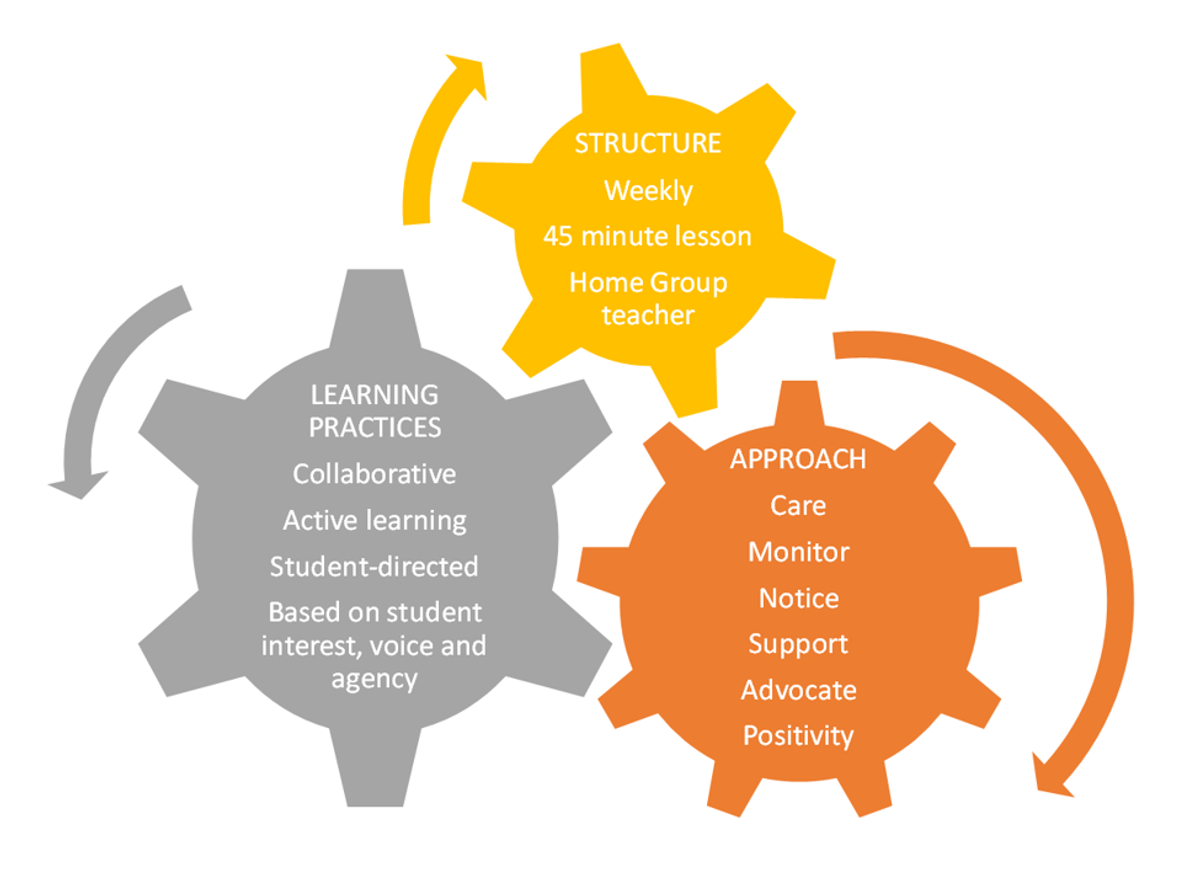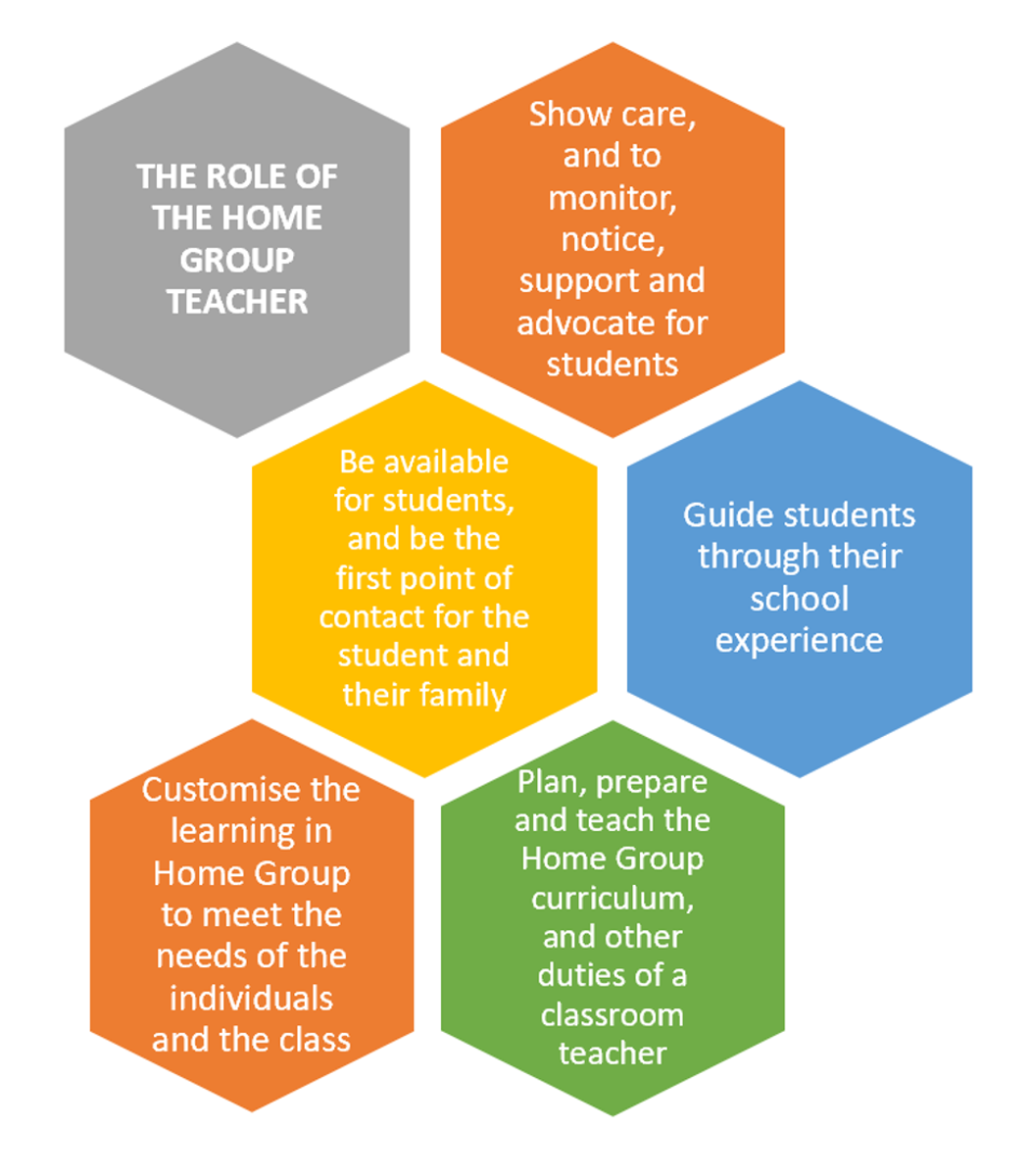pastoral care & wellbeing

home group @ brunswick
Claudia Johnson
Assistant Principal
Brunswick Secondary College has a pastoral care program from Year 7 to Year 12. Pastoral care is the structures, practices and approaches to support the wellbeing and development of young people. Home Group is where pastoral care will come to life at Brunswick Secondary College.
'Pastoral care is the ‘oil of learning.’ Pastoral care is not the destination but the nourishment for the learning journey. '
Mann, 2006
'There is strong and consistent and evidence that effective schools ensure that every child has a secure, positive and ongoing relationship with at least one staff member.'
Moore et al, 2013
Additionally, programs that target social and emotional learning (SEL) have a positive and significant impact on attitudes to learning, social relationships in school, and student achievement. (Education Endowment Foundation, 2015).
Our Purpose
The purpose of Home Group is to promote and maintain a supportive environment and positive relationships with the teacher and the class. This is in order to develop a sense of belonging and connectedness within the school and an environment that enables the whole student to thrive.
'Academic learning prepares students for the future. Pastoral care prepares students for right now. '
Ben Shepperd, 2018
Our Guiding Principles
We will promote and maintain a supportive environment and positive relationships by:
Home Group teachers caring, monitoring, noticing, supporting, and advocating for students
Students voicing opinions and ideas, having input into their learning, and being empowered to be active leaders in class, the school and the community
Supporting goal setting, progress reflection and goal review
Promoting personal growth and social development
Celebrating achievements
Home Group Structures
Students will remain in their core class groups – these will be called Home Groups. A Home Group teacher is allocated to each Home Group and will teach this class for a weekly Home Group lessons. Wherever possible, the Home Group teacher will also teach this class in another subject. At times, this is not possible, particularly as students in Years 9 - 12 are increasingly or fully in elective classes.
All Home Group classes will be on Thursday at the same time. This provides opportunity for students in different year levels to work together.
Classroom activities
Every student in Year 7 to Year 12 participates in activities across the five areas of Community, Student Voice, Celebrate, Social and Emotional Learning and Achieving Goals. Local and international research describes these areas as being key to providing a rich and meaningful pastoral care program.
In some cases, the activities are the same or similar at each year level, such as the expectation that you have a year level Celebration Day at the end of the year. In other cases, the activities are different, and are developed to be suitable to different ages or stages of development.
Home Group teacher role
The role of the Homegroup teacher is to:
- Show care, and to monitor, notice, support and advocate for students
- Be available for students, and be the first point of contact for the student and their family
- Guide students through their school experience
- Customise the learning in Home Group to meet the needs of the individuals and the class
Parents are encouraged to contact the Home Group teacher in regard to wellbeing issues such as your child feeling worried about school work, being upset about a friendship issue, or needing to have someone look out for them. Issues relating to the classwork should still be directed to classroom teachers, and issues relating to serious wellbeing concerns such as mental health should be directed to the Year Level Coordinator. In any case, the Home Group teacher or Year Level Coordinator will ensure that the most suitable person helps you and your child.
Further information to our parent and carer community will be offered in an information session in early 2019. This will be advertised via Compass Newsfeed.
Evidence-base for social and emotional learning:
- Programs that target social and emotional learning (SEL) have a positive and significant impact on attitudes to learning, social relationships in school, and student achievement. (Education Endowment Foundation, 2015).
- A 2012 meta-analysis of 75 studies found that there were beneficial effects across seven different outcomes: social skills, antisocial behaviour, substance abuse, positive self-image, academic achievement, mental health, & prosocial behaviour (Sklad et al, 2012).
- A 2008 report summarised SEL programs across 317 studies. It found that SEL programs were beneficial in both school and after-school settings and for students with and without behavioural and emotional problems. SEL programs were effective at improving social-emotional skills, attitudes about self and others, connection to school, positive social behaviour, emotional distress, and academic performance (Payton et al, 2008).
- Schools can effectively prevent disruptive behaviour by developing students’ social and cognitive skills, such as anger management, empathy training, and social problem-solving skills (Centre for Allied Health Evidence, 2009).
Evidence base for fostering teacher and community connections:
- Effective schools ensure that every child has a secure, positive and ongoing relationship with at least one staff member. (Moore et al, 2013).
- Research has shown that relationships can affect student learning – there are effects for both positive and negative relationships (Roorda et al, 2011). Negative relationships can make students less happy about coming to school or participating in class. Teachers can improve relationships by showing they understand and care about individual students and trying to see student perspectives (Hattie, 2009).
- Hattie found an effect size of 0.72 for teacher-student relationships (Hattie, 2009).
- Evidence shows that social emotional programs involving a classroom component with parent component (or school-wide initiatives) improve conduct problems, emotional distress, and academic performance (Durlak et al, 2011; Payton et al, 2008).




